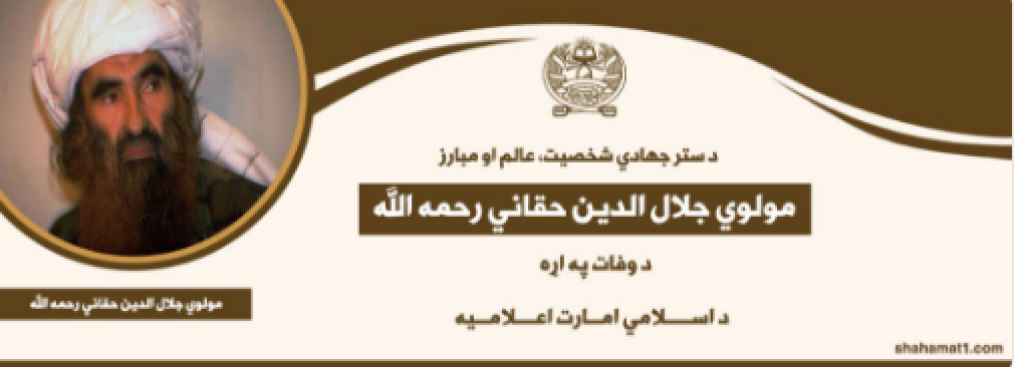The Taliban announced today that Jalaluddin Haqqani, the founder of the Haqqani Network and senior leader of the Islamic Emirate of Afghanistan, died of complications from a long illness. Jalaluddin’s death will have little impact on the Taliban as his son, Sirajuddin, has proven to be a highly effective leader and successor.
Jalaluddin’s experience in the jihad spanned four decades. He fought the Soviets, served as the Minister of Frontiers during the Taliban rule of Afghanistan from 1996-2001, was a member of the Taliban’s Quetta Shura, or governing body, and the father of several sons who sought to emulate him. One son, Sirajuddin, serves as the Taliban’s deputy emir and military commander. Another, Badruddin, who was the military commander of the Haqqani Network, was killed in a US drone strike in Pakistan.
“Minister of Frontiers during the reign of Islamic Emirate and member of the Leadership Council, the esteemed Al-Haj Mawlawi Jalaluddin Haqqani has passed away after a long battle with illness,” according to a statement released by Taliban spokesman Zabihullah Mujahid.
Jalaluddin was a revered figure in the jihadist world. He was closely tied to al Qaeda and a host of jihadist groups operating in Pakistan and Afghanistan. He also had extensive ties to wealthy donors in the Gulf countries. [See LWJ reports, Osama Bin Laden’s Files: ‘Very strong military activity in Afghanistan’ and Taliban rejects peace talks, emphasizes alliance with al Qaeda in new video.]
Jalaluddin also was instrumental in mediating disputes between varies jihadist factions in the Afghan-Pakistan region. After the controversy over Mullah Omar’s death (the Taliban leadership hid his death for two years before it was exposed), Jalaluddin used his influence and backed Mullah Mansour, Omar’s successor. Jalaluddin also brought factions that broke away from the Taliban back into the fold.
The Taliban, in its statement announcing Jalaluddin’s death, acknowledged his role in keeping the Taliban intact.
“The actions and exploits of Haqqani Sahib and his untiring efforts to keep the Islamic Emirate united in the face of American invasion are golden chapters of history which future Islamic generations shall forever be proud of,” the statement said.
As founder of the Haqqani Network, Jalaluddin put a jihadist network in place that spanned both Afghanistan and Pakistan. He wielded considerable influence within Pakistan’s tribal area, where Sirajuddin continues to do so to this day. Pakistan’s Inter-Service Intelligence Directorate had a close relationship with Jalaluddin, and also maintains close relations with Sirajuddin.
The US government has listed the Haqqani Network as a terrorist entity and designated 13 Haqqani Network leaders as global terrorists, while noting their ties to al Qaeda. However, inexplicably, Jalaluddin was never listed as a terrorist.
While many analysts have declared the Haqqani Network to be a separate entity from the Taliban, Sirajuddin and his son went out of their way to dispel that notion. In 2008, Jalaluddin addressed the issue head on, saying that “all the Mujahideen wage jihad under the leadership of the Ameer ul-Momineen Mullah Mohammed Omar Mujahid against the American invaders and their lackeys.”
“There is no crisis (of division) under the names moderate or extremist among the Mujahideen,” Jalaluddin continued. “They all fight under a unified leadership.”
The Taliban also denied any separation between it and the Haqqani Network. In Sept. 2012, the Taliban released a statement on its website declaring that there is “no separate entity or network in Afghanistan by the name of Haqqani.”
The Taliban, which acknowledged Jalaluddin was ill and bedridden for several years, has been preparing for his passing and grooming his successor. Sirajuddin has managed the daily operations of the Haqqani Network for several years and has risen to the top level of the Taliban leadership.
Since Sirajuddin was elevated to military commander and deputy emir after the death of Mullah Omar, the Taliban has waged a highly successful insurgency in Afghanistan; the Taliban is stronger today than at any point since the US invasion in 2001. The Haqqani Network, under Sirajuddin’s leadership, has remained intact in North Waziristan, despite enormous US pressure on the Pakistani government to dismantle it.









7 Comments
Not surprisingly he’s probably died in a house in Pakistan, where the ISI has protected and supported the Haqqani network. I doubt the Pakistanis would ever stop training the Taliban, even if they suffer the consequences of frankenstein islamic terrorists attacking the Pakistani army, or severe economic sanctions against them. The Taliban is like their children and the ISI are the parents, who would do anything to protect their children, even if they suffer the consequences.
Who benefits?
good! one down more to go! they are like roaches! crush them!
Pretty sure the Pakistani army provided him with all the comforts a man can need.
Agreed what you said. Pakistan who couldn’t see herself a united nation (due to composition of several other ethnicities based in Afghanistan and India) would never like peace and good relation in the region. The rulers in this country knew, once it start a good relation with their neighbors Pashtuns will join Afghanistan, Panjabies will join India as their birthplace and Balouch will like to have Balouchistan. For sure the only solution I could see for the region is composing a region without Pakistan.
Agreed, pakistan will always support the mujahideen, army or no army. muhammad through his quran tells every moslem to do this,no questions asked !!
This is why the mujahideen should experience only total war and overwhelming firepower from its enemy – the West. These uncivilized barbarian hordes should die. Only then will peace come to the world.